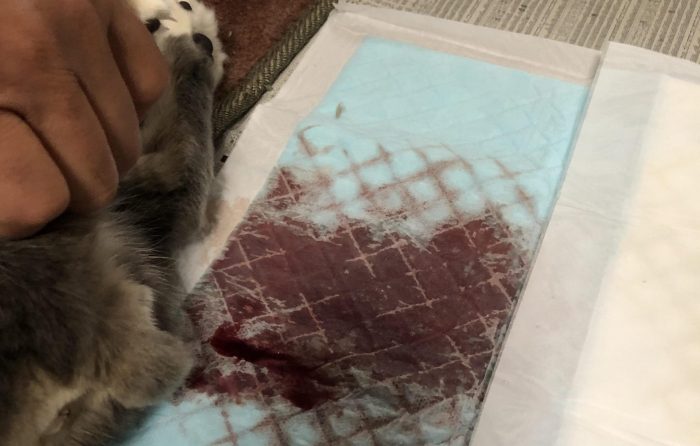Blood in pee is never a good sign for any animal. It can be a pointer to several health conditions ranging from mild to serious. When you have a cat peeing blood, it is important to pay close attention to what might have led to this. Has the visit to the litter box increased? Does the furball show signs of discomfort when trying to pee? Is there an increase in grooming, especially in the genital area? These are the questions that will help your vet pinpoint the actual problem before carrying out any type of test.
In the case of a cat peeing blood, the diagnosis and treatment might lead to a change in the diet and lifestyle of the cat to avoid future reoccurrence.
Table of Contents
Why Is My Cat Peeing Blood? Causes of Blood in Cat’s Urine
Hematuria or blood in the urine is said to occur when there is the microscopic presence of blood cells or red, brown, black, or pink urine. A cat peeing blood would display a lot of signs which is mainly characterized by frequent visits to the litter box and several other symptoms. There are several reasons that could lead to your cat having blood in its pee and there is no doubt that most of them would be health issues. Listed below are some possible reasons or conditions that would cause a cat to pee blood.
Urinary Tract Infection (UTI)
UTI is one of the major causes of blood in a cat’s pee. This condition comes with symptoms that are quite similar to FLUTD and can include excessive grooming in the genital area, straining to urinate, abnormal odor from the urine, and lethargy. As a pet parent, you need to pay attention to the activities of your cat and try to notice little changes that might mean something big.
Feline Lower Urinary Tract Disease (FLUTD)
This is also called Feline Idiopathic Cystitis and it is the most common general diagnosis for a cat peeing blood. It is a general term used to refer to inflammation in the urinary bladder. This is also one of the leading causes of the presence of blood in a cat’s urine.
Feline Urethral Obstruction
This is a urinary blockage that is common in male cats due to their narrow urethra. In this situation, a cat strains to urinate and little or no drop comes out. This situation is quite serious and can be life-threatening if left untreated for a few hours. To treat this condition, sedation is required and oftentimes, a catheter is used to flush whatever is blocking urine from flowing freely.
Bloody Diarrhea or severe constipation
This can be caused by gastrointestinal bleeding which ultimately leads to a watery stool that contains blood. The condition is also said to cause blood to appear in cats’ pee.
In all, there are several health issues that could lead to a cat peeing blood and none should be taken lightly. Imagine having urine build up in your body all day without being able to relieve yourself or putting up with a urinary tract disease. These conditions are as uncomfortable as they sound and should be treated with urgency. Other factors that might cause blood to be present in a cat’s pee include bladder stones, cancer, urinary tract tumors, trauma, and bleeding disorders.
Should I be Concerned if My Cat Is Peeing Blood?

Yes Yes Yes!!! A cat peeing blood is definitely a cause for alarm and failure to act fast might be fatal. If your cat begins to show signs of blood in its pee, the problem can range from mild to serious which is why it’s important to get to the vet immediately it is noticed to avoid further complications. Since you are the parent and your cat is, well, a cat that can’t talk, it is up to you to know when a health challenge like pee in blood comes up.
Is there a Home Remedy for when my Cat is peeing blood?
We know there are several conditions that can be changed for good with the help of natural antibiotics at home but this is not one of those. Hematuria or bloody urine is not a condition that can be treated at home. You need to visit a vet immediately to ascertain the actual problem and get a professional diagnosis and start the treatment procedure as soon as possible.
How To Treat a Cat Peeing Blood
If you discover blood in your cat’s urine, it is better to have the furball examined by a vet immediately. It is safer to have a proper diagnosis and commence treatment on time in order to quickly get a handle on the situation before it begins to degenerate.
After a thorough examination which might include a complete blood cell count test, urinalysis, blood chemistry panel test, abdominal x-rays, and ultrasounds to help with proper diagnosis, there are different ways to tackle the problem, depending on the cause of bleeding. It could involve surgery (to remove bladder stones, medications (pain relievers, antibiotics, nutritional supplements), or perhaps a change in diet.
A cat undergoing treatments for peeing blood should be kept indoors and monitored closely. They should be encouraged to eat, drink enough water and take prescribed medicines. Pet owners cannot make the mistake of discontinuing drugs, especially after their condition has returned back to normal. It is better to run the entire course of the drugs, especially antibiotics, to avoid another re-occurrence. Moreover, the body can build up resistance against the drugs if the prescribed dosage is not completed.
Read Also: How To Treat A Cat Abscess
How do I prevent my Cat from Peeing Blood?
According to research, cats that eat moist diets have fewer cases of blood in their pee. To prevent your cat from having this problem, it is advisable to increase its fluid intake. Cats are poor drinkers so the water has to be as appealing as possible so they are encouraged to drink.
Another factor that can prevent your cat from peeing blood is reducing its stress. According to vets, stress reduction seems to help in decreasing the incidence. So, a cat’s environment has to be kept interesting and stress-free.
